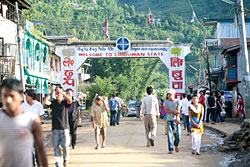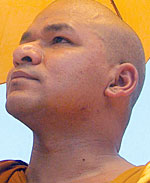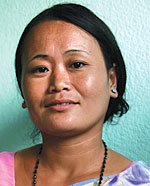 KIRAN PANDAY |
We need to step back and take a fresh look at the problems involved, not least because the commission doesn't have the right to preempt the popularly elected CA.
For one, the proposed ethnic federalist model impinges on a citizen's right to equal access to national resources since it grants communities special rights to provincial forests, mines, rivers. This pits communities directly against one another since it encourages them to undercut one another's rights.
The recent cold-blooded murder of seven yarsagumba harvesters from Gorkha by a local community in Manang prefigures the devastating consequences a federal arrangement could have. It could also set off a wave of internal migration and displacement, as we've already seen in the Tarai.
Second, the proposal to entitle particular ethnic groups to the exclusive leadership of particular provinces could take the country down the Yugoslavia path. Take the proposed Newa province in Kathmandu Valley. Since only 45 per cent of the valley is Newari, the majority will perpetually be led by a minority. If the valley's 11 adjoining districts were included in the province, then 25 per cent would rule the rest. This will also require the government to split up territory that many groups claim, which could set off race riots.
Third, federalism will be very costly since it will create many more high offices of state to be filled with pompous personalities. We already have a president who likes stopping traffic when he's on the road, and a trouble-making vice president who puts even the ex-crown prince to shame. Federalism will elevate more people like this to the posts of governors and ministers at the provincial level. The question is: do taxpayers really want to shoulder this extra administrative burden?
Finally, federalism in itself won't accomplish what it sets out to do: empower ethnic and marginalised communities. The unitary structure at the provincial level will continue to leave some groups out of power. It will add one more layer of politicos to the bureaucracy who will leach off money that's supposed to help people. Already, less than half of the money slated for development work actually reaches the people. Provincial federalism could exacerbate this tendency. Instead, we should devolve power to the grassroots level and skirt the provinces. This way, there will be less corruption and greater representation.
Federalism has its merits, of course, but it's dangerous at the doses we're recommending. The right medicine, at the right time, at the right level will work. No more, no less.
We need to discuss federalism in more detail and rejecting it doesn't mean less representation. Take the demand for a Newa province as an example. If one is to look around, many of the major cultural celebrations of Nepal are based on Newa culture. Similarly, what is famed as Nepali architecture is actually Newa architecture. Therefore it is in the Newa interest to ensure that our motherland, Nepal, doesn't disintegrate due to problems with its proposed federal structure.
Newa identity is like a fish that will not survive outside water, in this case, our motherland. The same could be said of all of Nepal's ethnicities, scattered as they are across the country. It is just not worthwhile to split this country along ethnic lines.
Ratna Sansar Shrestha is a water resource analyst.
"Humanitarian, not Maoist"
Shramaner Anand, Maoist CA member, Kathmandu
How did you spend the last year in the CA? 
In the 13 months that the CA has been running, good and bad things have happened. We declared the country a republic during the first CA session, and then got ordinary people's suggestions for the constitution and on this basis began work on preliminary drafts within our thematic committees. Five committees have finished their drafts already. But there's growing mistrust between the parties, which has put the constitution work on hold. I'm beginning to think that the constitution won't be written on time.
You're a monk and a Maoist. Isn't that a contradiction?
Religion is about equality, happiness, humanity and is revolutionary in its own way, so what Buddha preached 2500 years ago isn't too different from what the Maoists are saying now.
But Buddha wasn't violent like the Maoists, right?
I don't believe in violence, it's inhuman.
If you don't believe in violence, how did you ever fall in with the Maoists?
After training to be a monk in Sri Lanka for 20 years, I returned to Nepal in 2001. After witnessing the violence here, like other monks, I wanted to convince people to turn against violence, which required that I stay close to Maoist fighters, which is why I'm officially a Maoist CA member. But I'm a humanitarian, not a Maoist.
Are you for a unicameral or bicameral system?
Let's see if a unicameral system works first, since we're in an experimental phase right now.
Will the constitution be written on time?
The parties must first cooperate, focus on the people's demands, and there shouldn't be any more protests. If all this happens, the constitution will be written on time.
"Almost done"
Shakuntala Lepcha, UML CA member, Ilam
How have you spent the last 13 months in the CA? 
We're currently writing preliminary drafts on the basis of the suggestions we received from ordinary people. Five committees have finished their drafts already. Although the schedule's already been revised a couple of times, there's no need to panic. CA members should work deliberately, not hastily.
Has your committee finished its draft?
I am in the Protection of Minority Rights and Marginalised Communities committee. We've already submitted the draft and have begun discussions on it.
The house is frequently disrupted. At this rate, will the constitution be written on time?
If the parties stop bickering, the government is more sensitive and CA members work really hard then the constitution can be written on time.
Do you support a unicameral or bicameral system?
A bicameral system, with a lower and upper house, would be best
for Nepal.
What should be the official state language?
First of all, we're all Nepalis, almost everyone understands Nepali, so the government should conduct its work in Nepali. But the government must help to develop the other languages that Nepalis speak.
How does it feel to represent the less than 4000-strong Lepcha community?
This is the first time in 240 years that a Lepcha got this far up in government. There are two of us in the CA right now, the other being Tikaram Lepcha. We were both elected from the same place. We are both extremely proud of the fact. The 2001 census recorded 3,600 Lepchas in Nepal.


